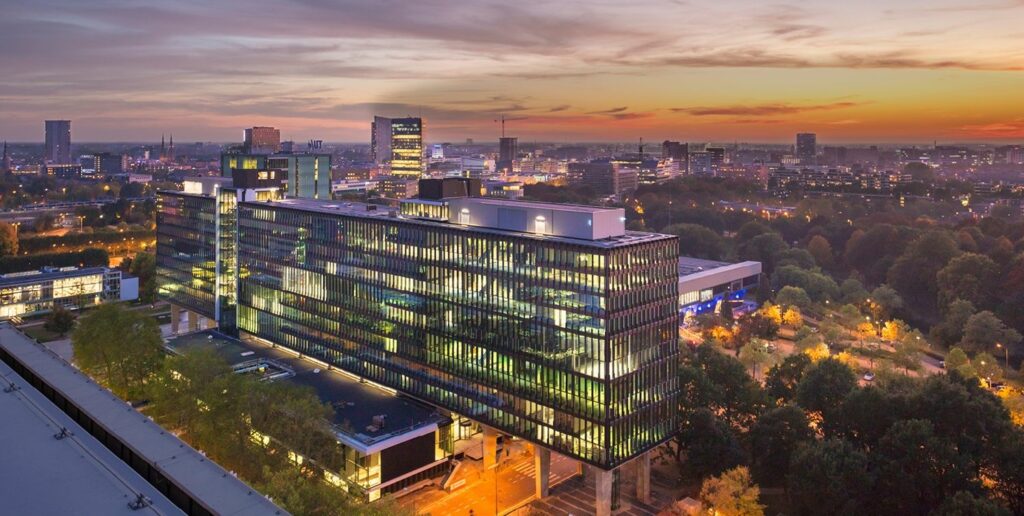
Job description
Research background
Soft robotics is a relatively new subfield of robotics that deals with constructing robotic functions from compliant materials. Soft technologies and integrated soft systems can revolutionize the use of robotic devices, for instance in applications where elastic versatility and safe human/machine interactions are needed. It is predicted, and certainly has the potential, to lead to the development of radically new generations of machines. The examples are numerous. In the medical world, they will increasingly assist surgery, in-vivo therapeutic treatments or contribute to the rehabilitation of disabilities by exoskeletons. Soft robotic functions have the perspective to enhance the communication between man and machine or between machines mutually. We foresee that we can make materials that can feel, sense, behave and act as human skins, but with enhanced sensitivity and accuracy. They can be used as stand-alone and autonomous devices, but also be applied as coating or integrated with electronics or even with biological material to perform functions not accessible otherwise. And as a long-term perspective one can foresee the development of evolutionary self-developing soft robotics following nature’s approach to intelligent soft machines.
Projects description
In our research team we develop responsive materials that address the advancing needs in specialized medicine, man-machine communication and miniaturized mechanics. Smart soft materials are in potential capable to fill in gaps in present technologies and to generate new, specialized functions making use of their ability to adapt their shape, to comply to confined and sensible spaces and to provide their functional duty on location.
A key aspect of our projects is to translate molecular effects to macroscopic phenomena which, in turn translate into (robotic) devices. Consequently, the approach to successfully develop new robotic functions adapted to their field of application must be multidisciplinary, containing all the aspects from materials design/development, photonics, electronics and mechanics. In the material, the various molecular functions are brought together, and the soft robot is given a body, which can be as simple as a thin film actuator or coating, but also be complex consisting of a composite of materials in an accurate three-dimensional shape. It brings organic and inorganic materials together in hybrid materials, built around soft electronics. More information can be found at www.danqingliu.nl.
Job requirements
We are looking for talented, motivated and enthusiastic PhD and postdoctoral students who meet the following requirements:
- Background in chemical engineering, physics, mechanical engineering, materials science or bioengineering.
- Prior knowledge in soft matters, responsive materials and experience in microscopic techniques and device fabrication/ characterization are appreciated.
- Ability to independently work within a dynamic team and multidisciplinary research environment.
- Fluent in spoken and written English
Conditions of employment
We offer a challenging job for four years in a highly motivated team at a dynamic and ambitious university. You will work with innovative analytic equipment and you will be part of a highly profiled multidisciplinary collaboration where expertise of a variety of disciplines comes together. The TU/e is located in one of the smartest regions of the world en part of the European technology hotspot ‘Brainport Eindhoven’; well-known because of many high-tech industries and start-ups. A place to be for talented scientists! Furthermore we offer:
- A gross monthly salary in accordance with the Collective Labor Agreement of the Dutch Universities (CAO NU), starts with € 2.325,- in the first year to € 2.972,- in the fourth year.
- A full-time employment for four years, with an intermediate evaluation (go/no-go) after nine months. You will spend 10% of your employment on teaching tasks.
- Salary and benefits (such as a pension scheme, paid pregnancy and maternity leave, partially paid parental leave) in accordance with the Collective Labour Agreement for Dutch Universities, (€ 2.325,- in the first year to € 2.972,- in the fourth year).
- A year-end bonus of 8.3% and annual vacation pay of 8%.
- High-quality training programs and other support to grow into a self-aware, autonomous scientific researcher. At TU/e we challenge you to take charge of your own learning process.
- An excellent technical infrastructure, on-campus children’s day care and sports facilities.
- An allowance for commuting, working from home and internet costs.
- A Staff Immigration Team and a tax compensation scheme (the 30% facility) for international candidates.
Information and application
Information
Do you recognize yourself in this profile and would you like to know more?
Please contact the hiring manager dr. Danqing Liu e-mail: d.liu1[at]tue.nl.
Visit our website for more information about the application process or the conditions of employment. You can also contact ms. P.J. van de Weijer, HR-advisor, p.j.v.d.weijer[at]tue.nl.
Are you inspired and would like to know more about working at TU/e? Please visit our career page.
Application
We invite you to submit a complete application by using the apply button. The application should include a:
- Cover letter in which you describe your motivation and qualifications for the position.
- Curriculum vitae, including a list of your publications and the contact information of three references.
The selection of applicants and the job interviews will start immediately until we find a suitable candidate.
For this vacancy we will recruit simultaneously both internal as external. In the case of equal suitability internal candidates take priority over external candidates. An assessment can be part of the selection procedure.
We do not respond to applications that are sent to us in a different way. You can upload a maximum of 5 documents of up to 2MB each.




